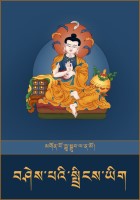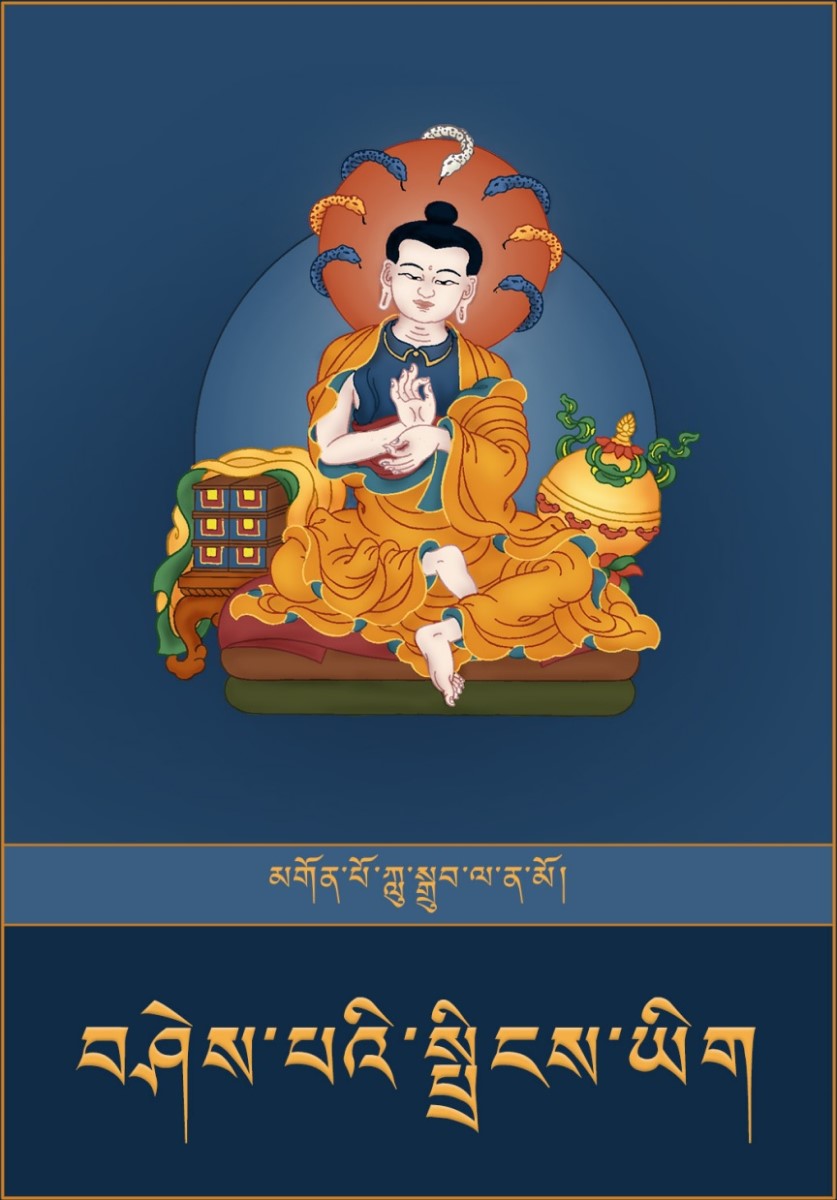藏文学习 | 中藏对照经文
龍樹親友書 (龍樹菩薩勸誡王頌)
Letter to a Friend by Acarya Nagarjuna
༄༅།། བཤེས་པའི་སྤྲིངས་ཡིག། །
རྩོམ་པ་པོ། ཀླུ་སྒྲུབ།།
作者: 龙树
Author: Nagarjuna
中文翻译摘自 2009年法王课上白话翻译
English translations source from H.H. course in 2009 from the stanza 1 to 13, others source from furhhdl.org

Uploaded on 10/05/2022
༄༅། །རྒྱ་གར་སྐད་དུ། སུ་ཧྲྀ་ད་ལེ་ཁ།
Sanskrit title:
梵語云:「蘇希列喀」
བོད་སྐད་དུ། བཤེས་པའི་སྤྲིངས་ཡིག
Tibetan title:
藏語云:「親友書」
འཇམ་དཔལ་གཞོན་ནུར་གྱུར་པ་ལ་ཕྱག་འཚལ་ལོ།།
I prostrate to the noble youthful Manjushri.
頂禮文殊菩薩。
Stanza One 第1偈
ཡོན་ཏན་རང་བཞིན་དགེ་འོས་བདག་གིས་ནི། །བདེ་བར་གཤེགས་པའི་གསུང་བསྙད་ལས་བྱུང་བའི། །བསོད་ནམས་འདུན་སླད་འཕགས་པའི་དབྱངས་འདི་དག །ཅུང་ཟད་ཅིག་བསྡེབས་ཁྱོད་ཀྱིས་གསན་པའི་རིགས། ༡ །
Listen now to these few lines of noble song that I’ve composed for those with many virtues, fit for good,
to help them yearn for merit springing from the sacred words of He Who’s Gone to Bliss.
為了您這位具有功德的真善之人,讓您能生起善功德,我造了這部論頌,
請您好好諦聽呀,這部論頌所說,都是佛陀的「聖人之言」。
Bamboo评论:言下之意,他就是佛陀。
Stanza Two 第2偈
ཇི་ལྟར་བདེ་གཤེགས་སྐུ་གཟུགས་ཤིང་ལས་ཀྱང༌། །བགྱིས་པ་ཅི་འདྲའང་རུང་སྟེ་མཁས་པས་མཆོད། །དེ་བཞིན་བདག་གི་སྙན་ངག་འདི་ངན་ཡང༌། །དམ་ཆོས་བརྗོད་ལ་བསྟེན་སླད་སྨད་མི་བགྱི། ༢ །
The wise will always honour and bow down to Buddha statues, though they’re made of wood;
So too, although these lines of mine be poor, do not feel scorn, they teach the Holy Way.
不管用什麼木頭來雕刻佛像,一切有智慧的人都會供養(因為所雕的都是珍貴的佛像),縱使我寫的詩偈並不巧妙,但這是依正法所說,您千萬別輕忽呀。
Stanza Three 第3偈
ཐུབ་པ་ཆེན་པོའི་བཀའ་ནི་སྙན་དགུ་ཞིག །ཁྱོད་ཀྱི་ཐུགས་སུ་ལྟ་ཡང་ཆུད་མོད་ཀྱི། །རྡོ་ཐལ་ལས་བགྱིས་དགུང་ཟླའི་འོད་ཀྱིས་ནི། །ཆེས་དཀར་ཉིད་དུ་ཅི་སྟེ་མི་བགྱིད་ལགས། ༣ །
While you have surely learned and understood the Mighty Buddha’s many lovely words,
is it not that something made of chalk by moonlight lit shines glowing whiter still.
善逝如來的教法,不管是否曾經聽聞過,再次聽聞都有助益。國王您之前雖已了解佛法,
再次聽聞,對您的修行更有幫助,這是非常殊勝美妙的;
就像月光照耀在白色的粉牆上,豈不是更鮮明美麗嗎?
Stanza Four 第4偈
རྒྱལ་བས་སངས་རྒྱས་ཆོས་དང་དགེ་འདུན་དང༌། །གཏོང་དང་ཚུལ་ཁྲིམས་ལྷ་རྗེས་དྲན་པ་དྲུག །རབ་ཏུ་བཀའ་སྩལ་དེ་དག་སོ་སོ་ཡི། །ཡོན་ཏན་ཚོགས་ཀྱིས་རྗེས་སུ་དྲན་པར་བགྱི། ༤ །
Six things there are the Buddhas have explained, and all their virtues you must keep in mind:
The Buddha, Dharma,Sangha, bounteous acts, and moral laws and gods-each one recall.
隨時憶念佛法僧三寶,隨時憶念布施、戒律及天人,
每一種隨念都會聚集功德,所以佛說我們應常常作這六種憶念。
六隨念:隨時憶念「佛、法、僧、施、戒、天」
Stanza Five 第5偈
དགེ་བའི་ལས་ལམ་བཅུ་པོ་ལུས་དང་ནི། །ངག་དང་ཡིད་ཀྱིས་རྟག་ཏུ་བསྟེན་བགྱི་ཞིང༌། །ཆང་རྣམས་ལས་ལྡོག་དེ་བཞིན་དགེ་བ་ཡི། །འཚོ་བ་ལ་ཡང་མངོན་པར་དགེས་པར་མཛོད། ༥ །
With body, speech, and mind always rely on wholesome deeds, the tenfold virtuous path.
Avoiding liquor at all costs, thus find true joy to lead a life of virtuous deeds.
我們的身語意,要常常親近「十善」業;相對地要遠離飲酒等「十惡」業,
也要從事清淨的行業,不可做殺生、販賣毒品、武器、生命等不淨行業。
Stanza Six 第6偈
ལོངས་སྤྱོད་གཡོ་བ་སྙིང་པོ་མེད་མཁྱེན་ནས། །དགེ་སློང་བྲམ་ཟེ་བཀྲེན་དང་བཤེས་རྣམས་ལ། །སྦྱིན་པ་ཚུལ་བཞིན་སྩལ་བགྱི་ཕ་རོལ་ཏུ། །སྦྱིན་ལས་གཞན་པའི་གཉེན་མཆོག་མ་མཆིས་སོ། ༦ །
Possessions are ephemeral and essence less—know this and give them generously to monks,
to Brahmins, to the poor, and to your friends: Beyond there is no greater friend than gift.
須知世間錢財的本質不是永恆不變的,所以我們應該如法地拿來供養出家眾,
並布施給貧賤的人等,(藏文版布施對象有比丘、梵志、貧者與親友)
未來世,布施必定會得到富裕的善果,就會像個最好的親友一樣,讓我們受用不盡。
Stanza Seven 第7偈
ཁྱོད་ཀྱི་ཚུལ་ཁྲིམས་མ་ཉམས་མོད་མི་དམའ། །མ་འདྲེས་མ་སྦགས་པ་དག་བསྟེན་པར་མཛོད། །ཁྲིམས་ནི་རྒྱུ་དང་མི་རྒྱུའི་ས་བཞིན་དུ། །ཡོན་ཏན་ཀུན་གྱི་གཞི་རྟེན་ལགས་པར་གསུངས། ༧ །
Keep your vows unbroken, undegraded, uncorrupted, and quite free of stain.
Just as the earth’s the base for all that’s still or moves, on discipline, it’s said, is founded all that’s good.
所有的功德,都是依持戒律才產生;如同有了土地,才能長出一切萬物。
(持戒時,不要犯了如下四種毛病:)不要「冗」:不要犯根本戒;
不要「瘦」:不要減弱對治力;不要「雜」:不要雜染「世間八法」、
混雜對此生的貪著;不要「悕」:不要混雜對來生的希求。
佛說,應該像這樣持戒。
Stanza Eight 第8偈
སྦྱིན་དང་ཚུལ་ཁྲིམས་བཟོད་བརྩོན་བསམ་གཏན་དང༌། །དེ་བཞིན་ཤེས་རབ་གཞལ་མེད་ཕ་རོལ་ཕྱིན། །འདི་དག་རྒྱས་མཛོད་སྲིད་པའི་རྒྱ་མཚོ་ཡི། ཕ་རོལ་ཕྱིན་པ་རྒྱལ་བའི་དབང་པོར་མཛོད། ༨ །
Generosity and discipline, patience and diligence, concentration and the wisdom of thusness-
Those measureless perfections, make them grow, and be a Mighty Conqueror, who’s crossed samsara’s sea.
布施、持戒、忍辱、精進、禪定、智慧,這六度波羅蜜多,功德不可思量,
為了度脫到彼岸,我們應修持這六度,以幫助自他度脫輪迴海,究竟成佛。
Stanza Nine 第9偈
།གང་ལ་ཕ་དང་མ་དག་མཆོད་བྱེད་པའི།།རིགས་དེ་ཚངས་བཅས་སློབ་དཔོན་བཅས་པའང་ལགས།།དེ་དག་ལ་མཆོད་གྲགས་པར་འགྱུར་བ་དང་།།སླད་མ་ལ་ཡང་མཐོ་རིས་འགྱུར་བ་ལགས།
Those who show their parents great respect with Brahma or a Master will be linked;
By venerating them they’ll win repute, in future they’ll attain the higher realms.
若是孝順奉養父母,未來世就可能以此善業生為梵王,
能這麼做,這一世能得到好名聲,來世還可生在天堂。
Stanza Ten 第10偈
།འཚེ་དང་ཆོམ་རྐུན་འཁྲིག་པ་རྫུན་དང་ནི།།ཆང་དང་དུས་མིན་ཟས་ལ་ཆགས་པ་དང་།།མལ་སྟན་མཐོ་ལ་དགའ་དང་གླུ་དག་དང་།།གར་དང་ཕྲེང་བའི་ཁྱད་པར་རྣམ་སྤང་ཞིང་།
Eschew all harm, don’t steal, make love, or lie, abstain from drink, untimely greed for food,
Indulging in high beds, and singing too, refrain from dancing, all adornments shun.
(受持「八關齋戒」時,)殺生、偷盜、邪淫、妄語等不善行都應斷除,
不過度飲食(過午不食),不坐臥華麗高廣的大床,
不飲酒,也不歌舞伎樂、不著香花鬘、不香油塗身。
Stanzas Eleven 第11偈
།དགྲ་བཅོམ་ཚུལ་ཁྲིམས་རྗེས་སུ་བྱེད་པ་ཡི།།ཡན་ལག་བརྒྱད་པོ་འདི་དག་དང་ལྡན་ན།།གསོ་སྦྱོང་འདོད་སྤྱོད་ལྷ་ལུས་ཡིད་འོང་པ།།སྐྱེས་པ་བུད་མེད་དག་ལ་སྩོལ་བར་བགྱིད།
For men and women who keep this eight-branched vow, and emulate the vows the Arhats took,
Their wish to nurture and to cleanse will grant them handsome bodies as celestial gods.
倘若男女眾能持守這八支聖戒(即「八關齋戒」),因為行持清淨,
可以讓善男子、善女人,投生到欲界六天以上。
Stanza Twelve 第12偈
།སེར་སྣ་གཡོ་སྒྱུ་ཆགས་དང་སྙོམས་ལས་དང་།།མངོན་པའི་ང་རྒྱལ་འདོད་ཆགས་ཞེ་སྡང་དང་།།རིགས་དང་གཟུགས་དང་ཐོས་པ་ལང་ཚོ་དང་།།དབང་ཐང་ཆེ་བས་རྒྱགས་པ་དགྲ་བཞིན་གཟིགས།
Stinginess and cunning, greed and sloth and arrogance, attachment, hate, and pride
(“I’ve breeding, good looks, learning, youth, and power”)—such traits are seen as enemies of good.
吝嗇、隱藏己過、裝腔作勢、貪求、怠惰,貪欲、嗔恨,
以及對於美貌、年輕、身分、地位等各種的驕慢或吹噓,
這些都是顛倒,是我們需要斷除的敵人。
Stanza 13 第13偈
།བག་ཡོད་བདུད་རྩིའི་གནས་དེ་བག་མེད་པ།།འཆི་བའི་གནས་སུ་ཐུབ་པས་བཀའ་སྩལ་ཏོ།།དེ་བས་ཁྱོད་ཀྱི་དགེ་ཆོས་སྤེལ་སླད་དུ།།གུས་པས་རྟག་ཏུ་བག་དང་བཅས་པར་མཛོད།
Carefulness is the way to deathlessness, While carelessness is death, the Buddha taught.
And thus, so that your virtuous deeds may grow, Be careful, constantly and with respect.
要證得無生的解脫,要隨時隨地對自己不放逸,
對自己放逸,是招致毀戒之途,
精進不放逸,能增長善法,
你可以修持謹慎之道。
Stanza 14 第14偈
།གང་ཞིག་སྔོན་ཆད་བག་མེད་གྱུར་པ་ལ།ཕྱི་ནས་བག་དང་ལྡན་པར་གྱུར་ཏེ་ཡང་།།ཟླ་བ་སྤྲིན་བྲལ་ལྟ་བུར་རྣམ་མཛེས་ཏེ།།དགའ་བོ་སོར་ཕྲེང་མཐོང་ལྡན་བདེ་བྱེད་བཞིན།
One who has formerly been heedless,
But later becomes heedful-like
Will also be resplendent like the moon free from clouds.
As in the case of Nanda, Angulimala, Ajatsatru and Udayana.
先時離放逸,後若改勤修,
猶如雲翳除,良宵睹明月,
孫陀羅難陀,央具理摩羅,
達舍綺莫迦,翻惡皆成善。
Stanza 15 第15偈
།འདི་ལྟར་བཟོད་མཚུངས་དཀར་ཐུབ་མ་མཆིས་པས།།ཁྱོད་ཀྱིས་ཁྲོ་བའི་གོ་སྐབས་དབྱེ་མི་བགྱི།།ཁྲོ་བ་སྤངས་པས་ཕྱིར་མི་ལྡོག་པ་ཉིད།།འཐོབ་པར་འགྱུར་བར་སངས་རྒྱས་ཞལ་གྱིས་བཞེས།
Since there is no penance like patience,
You must give anger no opportunity to arise.
The Buddha promised that by giving up anger,
One will attain the irreversible stage.
勇進是指苦行,沒有比安忍還要更殊勝的苦行,
不要給嗔恨機會,不要讓嗔恨有機可趁,
如此精進不懈,終可得到不退果,
這是佛陀親口所說。
Stanza 16 第16偈
།བདག་ནི་འདིའི་སྤྱོས་འདིས་གཏག་ཕམ་པར་བྱས།།འདི་ཡིས་བདག་གི་ནོར་ཕྲོགས་གྱུར་ཏོ་ཞེས།།ཁོན་དུ་འཛིན་པས་འཁྲུག་ལོངས་རྣམས་བསྐྱེད་དེ།།ཁོན་འཛིན་རྣམ་སྤངས་བདེ་བར་གཉིད་ཀྱིས་ལོག
I was abused by this, bound by this, defeated by this,
This one has snatched away my property’;
Such harboring of resentment produces quarrels,
By giving up resentment one will have peaceful sleep.
如果有人罵我、打我、欺負我,甚至奪我錢財,
我如果懷恨在心,只會惹來更多怨氣,
如果能放下怨恨,就可以在安樂中入眠。
Stanza 17 第17偈
།སེམས་ནི་ཆུ་དང་ས་དང་རྡོ་བ་ལ།།རི་མོ་བྲིས་པ་དེ་འདྲ་རིག་པར་བགྱི།།དེའི་ནང་ཉོན་མོངས་ཅན་ལ་དང་པོ་ནི།།མཆོག་སྟེ་ཆོས་འདོད་རྣམས་ལ་ཐ་མ་ལགས།
Recognise the mind to be like a drawing made on water,
On earth or on stone;
The first among these is excellent for those possessing the defilements,
And the last for those desiring dharma.
心,好比在水面、土面、石頭之上繪圖,
水上繪圖,馬上便消失;
土上繪圖,可以稍微持久一些;
在石頭上繪圖,可以保留百年、千年的時間。
我們的煩惱要像在水面上畫圖,至於修持慈悲,
要像在石頭上繪圖,讓慈悲心穩固堅實。
Stanza 18 第18偈
།རྒྱལ་བས་སྙིང་ལ་འབབ་དང་བདེན་པ་དང་།།ལོག་པ་སྨྲ་ལྡན་སྐྱེས་བུ་རྣམས་ཀྱི་ནི།།སྦྲང་རྩི་མེ་ཏོག་མི་གཙང་ལྟ་བུའི་ཚིག།རྣམ་གསུམ་བཀའ་སྩལ་དེ་ལས་ཐ་མ་སྤང་།
The Conqueror taught about three kinds of speeches possessed by people:
That are pleasant to the heart, truthful and wrong
Such words are like honey, flowers and filth.
Abandon the last of these.
佛陀說我們的語言分為三種:
一種是美麗的語言,像蜂蜜一樣,滋味甜美,
令人心生歡喜;
一種是真實的語言,像花一樣,人見人愛;
一種是虛妄的語言,像糞一樣,
人人避之唯恐不及。
我們應該捨棄後者,多說前兩者。
Stanza 19 第19偈
།སྣང་ནས་སྣང་བའི་མཐར་ཐུག་མུན་པ་ནས།།མུན་པའི་མཐར་ཐུག་སྣང་ནས་མུན་མཐའ་ཐུག།མུན་ན་སྣང་བའི་མཐར་ཐུག་གང་ཟག་ནི།།བཞི་སྟེ་དེ་དག་རྣམས་ཀྱི་དང་པོར་མཛོད།།
Four categories of persons are seen (who move) from:
Light to ultimate light, dark to ultimate dark,
Light to ultimate dark and dark to ultimate light;
Be the first among these.
現在光明,以後也繼續朝向光明;
現在黑暗,以後也繼續沈淪黑暗;
現在光明,以後卻退墮到黑暗;
現在雖黑暗,以後卻能轉為光明──
(讓自己的心依止善或惡、追尋光明或黑暗,)
有這樣四種人,
樂行國王啊,您應當依止第一種。
Stanza 20 第20偈
མི་ནི་ཨ་མྲའི་འབྲས་བཞིན་མ་སྨིན་ལ།།སྨིན་པ་དང་འདྲ་སྨིན་ལ་མ་སྨིན་འདྲ།།མ་སྨིན་མ་སྨིན་པར་སྣང་སྨིན་ལ་ནི།།སྨིན་པ་སྣང་ཞེས་བགྱི་བ་འདྲར་རྟོགས་མཛོད།
Persons should be understood to be like mango fruits which are:
Unripened yet appears ripe, ripened yet appears unripe.
Unripened and appearing to be unripe,
And ripened ones which also appears to be ripe.
一位菩薩如果有菩提心,
就像騎著一匹駿馬,
從光明善地,前往光明善地,
不會退墮到黑暗的地方。
Stanza 29 第29偈
།འཇིག་རྟེན་མཁྱེན་པས་རྙིད་དང་མ་རྙེད་དང་།།བདེ་དང་མི་བདེ་སྙན་དང་མི་སྙན་དང་།།བསྟོད་སྨད་ཅེས་བགྱི་འཇིག་རྟེན་ཆོས་བརྒྱད་པོ།།བདག་གི་ཡིད་ཡུལ་མིན་པར་མགོ་སྙོམས་མཛོད།
O knower of the world, the eight worldly dharmas-
Gain, loss, happiness, unhappiness, sweet words, harsh words,
Praise, and blame-should be regarded equally
As (they) are not worthy of your mind.
有利益,沒利益,痛苦,快樂,
背後稱頌,背後批評,當面讚美,當面譏罵,
要了知這八種,就是「世間八法」,
要讓你的心平穩,離開這「世間八法」。
Stanza 55 第55偈
ཚེ་ནི་གནོད་མང་རླུང་གིས་བཏབ་པ་ཡི།། ཆུ་ཡི་ཆུ་བུར་བས་ཀྱང་མི་རྟག་ན།། དབུགས་རྔུབ་དབུགས་གཉིད་ཀྱིས་ལོག་པ་ལས།། སད་ཁོམ་གང་ལགས་དེ་ནི་ངོ་མཚར་ཆེ།།
Life is impermanent (it is beset by) many misfortunes
Like a bubble of water caught by the wind;
That one inhales after exhaling
And awakens from sleep is wonderful.
我們的壽命,
受到災厄無常的影響,
好像風吹拂過水上的泡沫,
瞬間就可能破滅,
人命在呼吸間,一旦一口氣停了,
晚上躺上床睡覺,
早上想再起床都難了。
Stanza 58 第58偈
དེ་ལྟར་འདི་ཀུན་མི་རྟག་བདག་མེད་དེ།། སྐྱབས་མེད་མགོན་མེད་གནས་མེད་དེ་སླད་དུ།། འཁོར་བ་ཆུ་ཤིང་སྙིང་པོ་མེད་པ་ལས།། མི་མཆོག་ཁྱོད་ཀྱི་ཐུགས་ནི་དབྱུང་བར་མཛོད།།
O best of men, since everything is impermanent,
Devoid of self, refugeless, protectorless, and homeless,
Free your mind from Samsara
Which is like the pithless plantain tree.
像這樣的「無常」,也並非恆常,
所以不需要太恐懼。
(不過要了解這就是生命真相,一旦無常來臨,)
一切有情都是無依無靠、沒有救護、沒有家室的,也沒有人能讓我們長生不死
(這就是無常的本質),
身為人上人的國王您,
也要厭離這樣的無常法,
要了悟世間一切都像芭蕉一樣沒有實質。
相关课程 Related Courses:
Bamboo评论:看起来跟冈波巴写的论没啥两样啊!像是一个人写的似的。这些大师的废话都千篇一律!还以为龙树有多厉害呢!原来也是一名不符实的傻逼。
